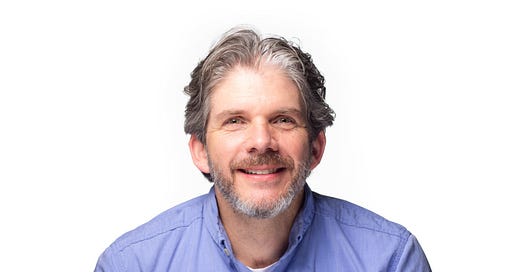A warm welcome to the 40 new subscribers who have joined since the last edition!
If you haven’t subscribed, sign up below to join a network of over 2,850 climate tech entrepreneurs and investors. The Green Techpreneur (GT) is a comprehensive platform with a marketplace and magazine to help your climate startup raise funds and gain the actionable insight you need to make your mark on the planet.
Investors take note!! We have a fantastic opportunity for you below to make money while making a real difference in empowering Sustainable Finance, Trade, Energy, Money & Community. Find out more below.
In tough-to-disrupt industries, going for size and scale can sometimes be the only way to truly rewrite norms and shake up supply chains that are at odds with people and planet.
This was the realisation that green techpreneur Boris Wullner Garces, CEO at Green Coffee Company (GCC) – Colombia’s largest producer of Arabica coffee – came to in 2021 when he set out on a scale up journey: “value share is very important for us: everything we do, we are not only doing for us as a company, we are also doing it for the coffee growers. We’re getting away from intermediaries and going directly to the consumer so we can pay a better price to farmers. But to do this, you have to have scale.”
Despite the coffee sector acting on sustainability initiatives, commercial practices still often exploit farmers with only 10% of coffee’s total value staying in the countries of origin. The coffee market is largely steeped in a power imbalance where coffee farmers are disempowered by intermediaries who control access to buyers and take the majority share of profits, while the coffee farmers are often left struggling to pay for education and healthcare.
“If you can buy green coffee at $1.09 per pound, and the roasters are selling you a bag of roasted coffee in the U.S. at $12.99 in the supermarket and it is only 12 ounces, who’s getting the money? Not the growers and they’re the ones doing everything,” says Boris.
In six short years since it’s founding in 2017, Columbia-based Green Coffee Company has not just grown into one of the largest coffee producers in the world, it has been on a fast-track growth journey to cut out intermediaries, disrupt, reshape, own and green every aspect of its supply chain.
“We’re thinking completely outside of the box: we are being disruptive at every step of the chain, from the nursery to the dry and wet milling to the roasting. We’re reducing our operating costs all across the chain….we’re attacking all the old parts of the chain that normally are not tackled by growers.
Today, GCC has more than 12.5 million coffee trees. Its size and scale gives it the bandwidth to successfully disrupt an often exploitative industry and its proving that the green economy is also better for business.
It implements cost-saving, cutting-edge technologies to green its supply chain and is a circular economy pioneer, adding new product lines by repurposing coffee cherry waste to produce ethanol (used in gin/vodka) and cascava flour.
“The company generates something very important in the agricultural sector: a mirror effect,” explains Marcela Urueña, Colombian government chief advisor for coffee affairs.
"I see them as an 'anchor producer' that sets the coffee business dynamics in the area …from delivering information about technologies to centralising purchases of fertilisers to get better prices for all producers around the region, sharing these economic benefits with all the small producers and coffee farmers around GCC. It is a truthful generator of enriched social networks that should lead to social and economic stability in the region where it is located."
GCC has already raised a total of $65 million of equity, and is currently seeking $65 million of institutional debt capital to execute expansion plans. By 2026, the company projects it will be in a position to launch a U.S. IPO exit.
Here’s a look at what it took to scale up and transform supply chains to put social and climate justice into the heart of your next brew.
How did you first get involved with GCC?
I'm a biological systems engineer. I've always been involved with agriculture. I spent over a decade working in the Colombian flower business, primarily in sales and marketing. Following that, I led Invest in Bogota, a startup incubator focused on bringing international business to the region. Before joining GCC, I held a position at a university as the Vice Dean for Biological Systems Engineering. I also took on consultancy roles and helped the Colombian palm oil industry improve their sustainability efforts.
When I was invited to join GCC in 2020, we talked extensively about the transformative changes they envisioned for the industry, I thought, ‘this is what I've been waiting for.’ We discussed the goal of becoming a highly profitable yet inclusive company. It seemed like the only way to change the culture in Colombia and provide growers with a sustainable income. These past 3.5 years with the company have been nothing short of amazing. We've accomplished so much.
How are you disrupting norms in coffee production?
We own the entire supply chain, the roasting, milling, byproduct and harvesting processes and then we go direct to consumers into mass market supermarkets in the U.S. and around the world.
We've been completely reimagining our approach to production. When we first embarked on this journey, the wet mills in the coffee industry felt like a trip back in time to the 1910s and 1920s. Today, we have state-of-the-art mills, fully optimised with cutting-edge technology. This transformation ensures not only profitability but also consistency, which we've incorporated into every step of our supply chain. We're disrupting the nursery process, we're disrupting wet milling, and we're even disrupting dry milling.
Sophisticated processing machinery in GCC’s wet mills recycles water so it uses just 0.3 liters of water per pound of green coffee compared to 20 liters per pound used in traditional processes.
We reuse coffee waste to create new product lines
We take a close look at every point where waste is generated and explore ways to turn that waste into an additional industrial benefit or reduce its environmental impact.
To produce one kilogram of coffee, you typically need five kilograms of cherries. Out of these five kilograms, approximately 2.5 kilos are considered waste or Cherry Cascara. We ferment and press the Cherry Cascara to extract cherry juice, which is rich in sugars. Through fermentation, we produce pure neutral ethanol. This ethanol will be available for commercial use next year, potentially in the form of spirits like vodka or gin. We also use the cascara to produce baking flour.
We’re exploring using the waste from our fermentation process; drying the waste material and subjecting it to a pyrolysis system, which would allow us to create biochar and generate energy.
Worker benefits
100% of our workers are formally employed with benefits and health insurance and they only work five days a week, 40 hours - not 7 days a week like all other growers in the area.
Cutting out intermediaries
Our journey began with internal sales to exporters in Colombia. Later, we expanded our reach by selling directly to U.S. importers. Last year, we introduced our green coffee brand to the European market, started a pilot programme to sell our specialty coffee brand online, and we're making steps to offer white-label products in the U.S.. We now have complete control of the supply chain and expect to sell millions of pounds of roasted coffee by year-end.
What’s ahead for your supply chain expansion plans?
We're diligently working on the necessary preparations to sell roasted coffee in the US: including hiring a sales representative, establishing a delivery structure, and ensuring we have all the right resources in place to sell directly to supermarkets.
We're taking a deliberate and careful approach to prevent any disruptions in our relationships. Building and maintaining strong relationships, especially with supermarkets, is crucial.
We want to ensure that when we establish these relationships, we have a seamless supply of products without any hiccups. Our strategy involves careful planning, relationship building, and steady growth as we continue to expand our presence in the coffee market.
What has been the hardest part of the innovation journey?
In Colombia, coffee growers are not accustomed to using a centralised wet milling facility. Instead, each producer has their own small, technologically dated wet mill, resulting in low efficiency. Convincing them to sell their cherries to a central facility to improve traceability, consistency, and quality was initially challenging because they weren't prepared for such a change. It took two years of training and teaching. This process has involved a complex cultural shift, as we needed to explain our approach and change how we communicate information to these growers.
Changing established cultural practices has been a challenging aspect of this endeavour, but it's ultimately proving successful.
Change requires audacity
What drives me and our team is determination, particularly when it comes to leveraging technology and adopting a circular economy approach. As a biological systems engineer, I have a knack for identifying ways to transform one thing into another.
When I spot opportunities, I act swiftly, but it requires a strong sense of determination. Our company culture thrives on constantly seeking ways to improve and disrupt the norm.
What does the future hold?
We weigh in on the cost of an investment, but if we see a compelling opportunity, such as the distillery project, where we're investing $8 million, it's a no-brainer investment because we anticipate recovering our investment in less than two years. For us, it's about seizing these opportunities and moving forward.
Our ultimate goal is to create a fully automated roasting process. This project represents a significant investment, totalling around $25 to $26 million.
Whats your mantra or life philosophy?
My faith as a Catholic deeply influences my approach to life. I believe in striving for excellence in everything I do. My motivation comes from my desire to lead a life that aligns with my faith, aspiring to be a better person and ultimately seeking a place in heaven.
In my professional endeavours, I always aim to do my very best, delivering the highest quality of work possible. As a family man, I endeavour to be the best husband and father possible.
When I was a kid, my Father always told us – and he was a very good guide – that regardless of your role, even if you're a garbage collector, always strive to be the best at what you do. This principle has become my personal mantra. I approach life with passion and give my absolute best.
………………………….If Boris could teleport himself into the future, and be anywhere, doing anything he’d be “doing the same thing, putting all my effort into what I have been fighting for – shared value – giving the community back what they are giving to me.”
Further Reading:
Harmony is Finally Coming to the Carbon Markets: How This Marketplace Platform Delivers Clarity
Meet the College Graduates Bringing Breakthrough Solutions to End Fast Fashion Waste.
How to Scale a Niche Product While Navigating Being Business and Life Partners
Make a Connection
Whether you’d like to find a mentor, an employee, a job, a business partnership, or just meet someone new over a virtual coffee who’s just as passionate about building greentech businesses – hit the button below and I’ll post a shout out for you in the next newsletter.
Thank you for reading and listening to The Green Techpreneur.
Have a great weekend! 🥂
#SparkTheTransition,
Marianne
P.S. If you enjoy reading the GT, please share this article to help spread the word!

















Share this post